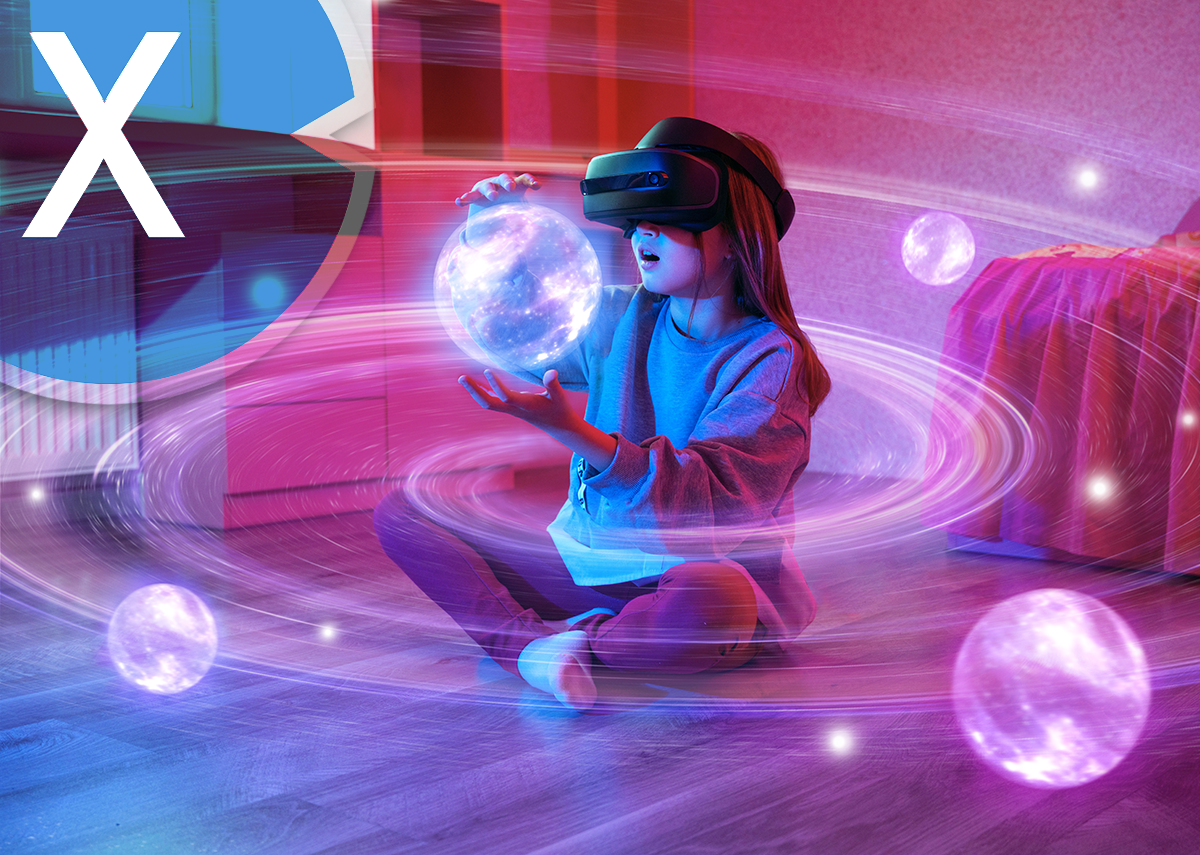
Augmented Intelligence: The basis for Web 3.0 and the metaverse of the future - Image: Xpert.Digital
🗒️ Augmented Intelligence: The foundation for Web 3.0 and the metaverse of the future
In a world that is constantly evolving, advancing technology opens new horizons. One such horizon that opens up before us is the concept of Web 3.0 and the metaverse of the future. A crucial component driving this progress is the idea of **Augmented Intelligence**, which is proving to be a significant advancement in artificial intelligence (AI).
What is Augmented Intelligence?
Augmented intelligence combines two fundamental aspects that shape our digital world: artificial intelligence (AI) and human intelligence. This symbiosis leads to an expanded form of intelligence that goes beyond traditional AI. While AI algorithms aim to imitate human-like intelligence, augmented intelligence goes a step further and integrates human creativity, emotions and intuition into technological advancements. This opens up fascinating possibilities for creating a more interactive and human digital environment.
The role of augmented intelligence in Web 3.0
The web 3.0, often referred to as the “Semantic Web”, is characterized by its ability to understand and process information at a semantic level. This is where the augmented intelligence comes into play. It enables not only to interpret data, but also to put it in a context and to draw relevant conclusions from them. This ability is crucial to create personalized user experiences and increase the efficiency of online interactions.
Augmented Intelligence and the Metaverse
The Metaverse is an emerging digital reality that includes virtual and augmented worlds. Augmented intelligence plays a key role here as it bridges the technological environment of the Metaverse and human users. It not only enables seamless interaction in these virtual spaces, but also the creation of customized experiences that meet the preferences and needs of each user.
The impact on the economy and society
The use of augmented intelligence has far-reaching effects in various areas. In business, it can lead to more efficient workflows by facilitating complex data analysis and promoting innovative solutions. In education, it can support personalized learning approaches tailored to students' individual strengths and weaknesses. Additionally, augmented intelligence can help break down social barriers by facilitating communication between people of different languages and cultures.
The ethical considerations
With such advancing technology, ethical questions also arise. How will augmented intelligence affect our privacy? What impact will it have on the job market? How can we ensure that this technology is used for the good of humanity? These questions are critical as we explore the frontiers of augmented intelligence.
Summary
Augmented Intelligence marks a significant step in the development of artificial intelligence. Integrating human creativity and intuition with technological advances opens up new possibilities for Web 3.0 and the emerging metaverse. As we embark on this journey, it is important to consider the ethical, societal and economic implications to ensure that augmented intelligence is used for the benefit of all humanity.
📣 Similar topics
- Augmented Intelligence: The Evolution of AI
- Web 3.0: The Semantics of the New Internet
- Aumgented Intelligence in the Metaverse: Human Interaction in Virtual Worlds
- Economic and social effects of augmented intelligence
- Ethics in the Era of Augmented Intelligence
#️⃣ Hashtag: #AugmentedIntelligence #Web3 #Metaverse #FutureTechnology #EthikAI
Our Industrial Metaverse configurator
Just try out our universally applicable (B2B/Business/Industrial) Metaverse configurator for all CAD / 3D demo options:
Xpert (B2B/Business/Industrial) Metaverse configurator for all CAD / 3D data can be used on all devices, one platform!
Suitable for:
Difference between Augmented Intelligence and Artificial Intelligence
The terms “augmented intelligence” (extended intelligence) and “Artificial Intelligence” (artificial intelligence) are closely linked, but they have subtle differences in their importance and application.
Augmented Intelligence 🧠🔍
Augmented intelligence refers to the integration of artificial intelligence (AI) into human decision-making and tasks. Unlike artificial intelligence, in which machines act and learn autonomously, augmented intelligence aims to complement and improve human intelligence. It is a symbiotic relationship between humans and machines, where machines are used to augment human capabilities rather than replace them.
A good example of augmented intelligence is the use of AI-powered analytics tools in various industries. These tools can process massive amounts of data and identify patterns that would be difficult for human analysts to spot. The human analysts can then use these insights to make informed decisions and solve problems more effectively.
Artificial Intelligence 🤖🧠
Artificial intelligence, on the other hand, refers to machines or computer programs that are capable of performing tasks that would normally require human intelligence. AI systems can learn to draw on experience, recognize patterns and improve themselves. This can come in various forms including machine learning, neural networks and deep learning algorithms.
A classic example of artificial intelligence is a self-driving car. The car uses sensors to detect its surroundings and uses complex algorithms to make real-time decisions, such as braking or changing lanes.
Differences and synergies 🔄
The main difference between augmented intelligence and artificial intelligence is that augmented intelligence aims to augment human capabilities and improve human decision-making. Artificial intelligence, on the other hand, focuses on developing autonomous systems that can carry out tasks independently.
However, these concepts often complement each other. In many cases, AI technologies are used to provide human decision makers with better information. For example, advanced analytics systems can process large amounts of data to provide valuable insights that human experts can then use to make informed decisions.
Summary 💡
Overall, augmented intelligence and artificial intelligence are different approaches, but they often overlap and work together to expand human capabilities and solve complex problems. While augmented intelligence supports human intelligence by integrating AI technologies into decision-making, artificial intelligence aims to create autonomous systems that can perform tasks on their own.
Similar topics 📣
- Augmented Intelligence vs. Artificial Intelligence: A Comparison
- Synergies between humans and machines: The world of augmented intelligence
- Autonomous systems of the future: The potential of artificial intelligence
- AI in practice: application examples of augmented intelligence
- The future of collaboration: How humans and machines can harmonize
#️⃣ Hashtags: #AdvancedIntelligence #ArtificialIntelligence #HumanAndMachine #AIandMI #FutureOfDecisionMaking
🗒️ Human-machine symbiosis: Augmented intelligence at a glance
Human-machine symbiosis, also known as augmented intelligence, is a fascinating concept that describes the collaboration between humans and machines to increase cognitive abilities. Unlike artificial intelligence, which aims to replicate human-like intelligence, augmented intelligence aims to expand and improve human capabilities. This is done by using technologies that support human decision-making, problem solving and information processing without replacing the human component.
Human-machine symbiosis leverages advanced technologies such as machine learning, neural networks and data analytics to process data in real-time and provide insights that would be difficult for human experts alone. This concept has applications in various fields including medicine, finance, science and industry.
Experts have recognized the importance of human-machine symbiosis and use it to make informed decisions and develop innovative solutions. Here are some key aspects of this concept:
🧠 Advanced analytics capabilities
Augmented intelligence enables experts to quickly analyze large amounts of data and identify patterns, trends and connections. By combining human intuition and machine learning, complex problems can be solved effectively.
🤖 Automate repetitive tasks
Routine tasks can be outsourced to machines, giving professionals more time for strategic thinking and creative tasks. This leads to greater efficiency and productivity.
📊 Data-driven decision making
By using data analytics, experts can make informed decisions. Machines provide real-time data and predict possible scenarios, which supports decision-making.
👥 Human interpretation
Human intelligence remains irreplaceable because of its ability to interpret complex emotions, cultural nuances and interpersonal relationships. Machines can provide data, but human intuition is essential for comprehensive understanding.
🌐 Global networking
Experts are connected worldwide through augmented intelligence. Knowledge can be shared and experiences can be exchanged, regardless of geographical boundaries.
🏥 Medical applications
In medicine, augmented intelligence enables more precise diagnoses and personalized treatment plans. Medical experts can access a comprehensive database of disease progression and treatment options.
💰 Finance
In the financial sector, human-machine symbiosis helps in analyzing market data, predicting trends and assessing risks. Experts can make informed investment decisions.
🛠️ Industry 4.0
In industry, augmented intelligence helps optimize manufacturing processes. Machine monitoring, quality control and error prevention are improved.
🔐 Data security and ethics
Experts must be aware that the use of technology also raises questions of data security and ethics. Protecting sensitive data and avoiding bias in algorithms are of great importance.
🌈 Future prospects
The human-machine symbiosis is expected to continue to gain in importance. New technologies and innovative applications will emerge as human-machine collaboration becomes increasingly central.
📣 Similar topics
- 🧠 Augmented Intelligence: The fusion of humans and machines
- 🌐 Areas of application: How augmented intelligence is revolutionizing various industries
- 💡 Expert opinions: Voices from the world of human-machine symbiosis
- ⚖️ Ethics and safety: challenges and solutions
- 🚀 Future prospects: How the symbiosis of humans and machines shapes the world
#️⃣ Hashtags: #AugmentedIntelligence #HumanMachineSymbiosis #FutureofWork #Innovations #ArtificialIntelligence
Xpert.Digital – Pioneer Business Development
If you have any questions, further information or need advice on the topic of Consumer Metaverse or Metaverse in general, please feel free to contact me at any time.
I would be happy to serve as your personal advisor.
You can contact me by filling out the contact form below or simply call me on +49 89 89 674 804 (Munich) .
I'm looking forward to our joint project.
Xpert.Digital – Konrad Wolfenstein
Xpert.Digital is a hub for industry with a focus on digitalization, mechanical engineering, logistics/intralogistics and photovoltaics.
With our 360° business development solution, we support well-known companies from new business to after sales.
Market intelligence, smarketing, marketing automation, content development, PR, mail campaigns, personalized social media and lead nurturing are part of our digital tools.
You can find out more at: www.xpert.digital – www.xpert.solar – www.xpert.plus

